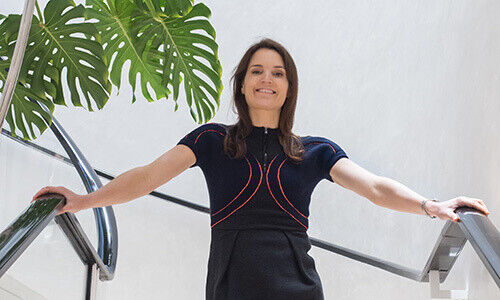Maxime Carmignac is a keen student of family-run business histories. She discusses with finews.com what it's like to have your name on the company letterhead among other topics.
Before joining her founding father Edouard Carmignac at the namesake firm in 2010, Maxime Carmignac worked for McKinsey for two years followed by two years at Carmignac as an analyst. Then it was off to New York for a two-year stint with alternative investment firm Visium Asset Management. She has been serving as managing director of Carmignac UK since 2013.
Carmignac embraces a long-term investment philosophy and has «skin in the game» for both its own and its client's investments demonstrating a commitment to the long term. «Being a family business, the clients know that I'm going to be here this year, and I'm going to be here for the years to come. So it helps, over time, to build this long-term trust and accountability,» she says, noting that in developed markets, family-run firms have historically outperformed those which are not.
Behemoth or Boutique?
With around 33 billion euros (33.2 billion Swiss francs) of assets under management, the company is clearly in the realm of boutique firms, and for Carmignac, not something that is seen as a disadvantage. What is currently evident is there is polarization in the industry, and one particular segment is facing challenges beyond the current market and geopolitical turmoil.
«When you are a behemoth asset manager, you can compete for price and scale. When you are a boutique, you try to do your best in some specific niches. I think the difficulty is being in the middle which is being squeezed,» she says. What she stresses to clients and her team is «that we don't want to pretend to be good at everything but want to be the best at some specific niches.»
Active Investing
It is within those niches where she concentrates her firm's efforts. In recent years with a booming stock market, it was enough for many investors to place their funds into exchange-traded funds (ETFs), and let the markets do their magic. But with the war in Ukraine, and central banks raising interest rates in the face of rising inflation roiling markets, that changed.
«I think active management will become more relevant and appropriate because of the challenging times,» she says. To be sure, active management of client funds is a big chunk of revenue for wealth managers. Carmignac sees it from the point of the client saying «it is important to be able to outsource the stress of investing to people you trust.»
Again it comes down to long-term investment. «If you are comfortable with volatility, you can invest for the longer term and need active management,» she adds.
Women Investors
Another area where Carmignac identifies opportunities is for female investors, where she sees an underserved market as well as differences between men and women in terms of how they invest.
She observes that women are focused on the «why», whereas men are focused on the «how».
For example, «women want to know that investing will enable them to buy a house and pay school fees for their grandkids. Whereas men tend to like the riskier aspect,» she says, adding «when it comes to investing, women are generally more long-term focused, more sustainability-focused, and often less confident than men.»
Sustainable Investing
From that perspective, it seems fitting that Carmignac is also a member of the firm's strategic development committee, responsible for setting up the firm's strategy that focuses on responsible investment and investment solutions.
While it appears paradoxical that firms offering sustainable products invest funds in companies that are considered to not be particularly sustainable, Carmignac explains what is important is a company's trajectory toward becoming more sustainable and meeting ESG goals.
It is a matter of being realistic since «we cannot switch overnight to 100 percent renewables,» she stresses. It is also where active management can play an important role in this.
«We already divested some names because they were not meeting ESG targets. This is very important and part of our active approach, and we engage 100% with the companies we invest in.»
Sustainability Data
One of the challenges facing investors in the sustainability space is standardized ESG data since it is currently not particularly structured. There are a wide variety of reporting metrics available in the ESG sector which presents challenges. Still, this is fairly typical for just about any type of data at the beginning.
Carmignac agrees. «This is indeed a minefield. As active managers, what we have to try to do first is be agile and innovative because there are always new providers. But we also have to exercise human judgment, and try to understand who is good at what.»
«In the context of the absence of clarity from the regulators and absence of detailed disclosure from corporates, we feel that as a responsible steward of capital, it is key to be transparent about our ESG investment process and criteria, to empower our clients to allocate their capital based on their ethical stance.»




































